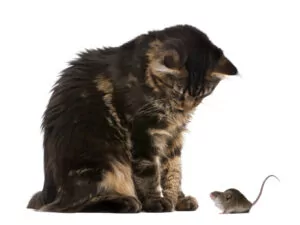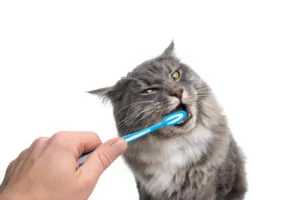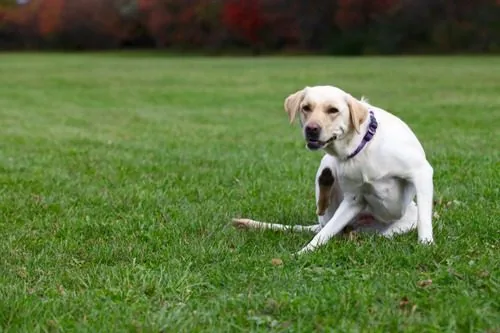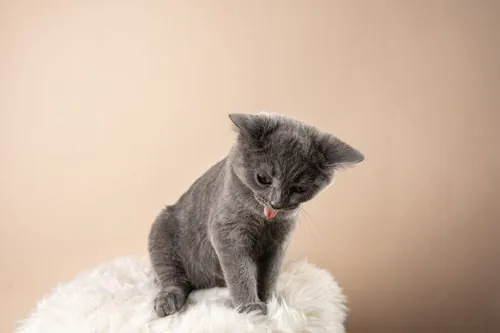My Cat Killed a Mouse But Did Not Eat it: What to Do
Cats love the thrill of the hunt and sometimes they bring their trophies home as gifts. You may think your cat is an angel with whiskers, but they are hunters, skilled and adept at catching and killing their prey. So, what do you do if your cat brings home a dead mouse?
When your cat kills a mouse but does not eat it, you must first get it away from your cat. Mice carry many diseases, and you do not want to risk your cat getting sick. You also want to clean the area with a feline-friendly concentrated bleach and water solution.
Ensure you brush or clean your cat’s teeth after a dead mouse is in their mouth. Read on to learn more about what to do if your cat kills a mouse but does not eat it.

What to Do if My Cat Kills a Mouse?
Cats are born predators, and it is no secret that they like to hunt and kill prey, even when they are not hungry. This is why cats were considered expert mousers and were utilized to kill rodents on Viking ships thousands of years ago when these ancient Scandinavian people set sail to conquer the world. Can’t you picture your furry feline wearing a little Viking hat?
Cats have paid homage to their lineage by remaining active hunters to this day. Even indoor-only cats have been known to catch mice that have snuck into the house to snatch up a crumb. What do you do if your feline has killed a rodent but did not eat it? The following are some possible solutions for this dilemma:
1) Keep Your Cat From Eating It
If you see that your cat has caught a mouse and killed it, you need to act fast. Grab the mouse by the tail and get it away from your cat. If you have time to wear latex gloves first, you should protect yourself, as mice have diseases. You do not want your cat to eat a mouse they caught since mice can have:
- Lymphocytic choriomeningitis
- Leptospirosis
- Toxoplasmosis
- Hantavirus
- Typhus
- Plague
These diseases are harmful to your cat and can make them sick. Ensure you wash your hands thoroughly and disinfect them after removing the mouse from your cat’s custody because you do not want to get sick, either.
Another reason to not allow them to eat a mouse is that you do not want your cat to ingest any poison their prey has ingested, since people will commonly use poison to rid mice.
2) Clean Up The Area
Get a pair of latex gloves and paper towels to retrieve the dead mouse and get ready to dispose of it properly. However, you must first spray the dead mouse and the adjacent area with bleach and water. A 1:32 dilution is best to use so that it does not harm your cat. This is what works best to be both efficient and secure.
The more diluted the bleach, the less toxic it is. You also want to block off the area you are working on to clean until the space is again safe for your feline companion. The goal is to dilute the bleach, promptly clean the area, and wipe it up. The site should be rinsed and completely dry before allowing your cat to come near it.
3) Properly Dispose of The Mouse
You want to make sure you throw this dead critter away correctly. Without allowing your cat to get a hold of it again, put the mouse in an empty plastic trash bag. Seal the bag tightly. Put that plastic trash bag into another empty trash bag and seal it. Throw the mouse away outside in the garbage. After you dispose of the mouse, wash and disinfect your hands.
4) Brush Your Cat’s Teeth and Clean Their Mouth 
Ensure you use a toothbrush and toothpaste specifically made for cats, and never use human toothpaste on your cat. You want to perform this task immediately to remove the bacteria from your cat’s mouth. To brush your cat’s teeth:
- Put a dollop of toothpaste on the toothbrush and allow your cat to sniff. Hold your cat’s head at a 45-degree angle to get ready to brush.
- Position the palm of your hand on the top of your mouser’s head toward the back. Position your index finger and thumb to hold under the cat’s eyes.
- Pull down your feline’s lower lip and brush the two canine teeth at the front of the mouth, gradually increasing the number of teeth brushed.
- Move the brush in small circular motions and start at the back. Brush for about half a minute on each side.
Of course, you should wear latex gloves while brushing their teeth. You want your cat’s mouth to be impeccably clean after having a mouse in it. It is safer for them, and you will feel better about accepting kitty kisses afterward.
How to Lower The Risk of Your Cat Preying on Mice
Although it would be near impossible to completely eliminate your cat’s natural prey drive, there are a couple of steps you can take to lower the chances your cat comes in contact with disease-carrying animals.
1) Attach a Bell to Your Cat’s Collar
You can attach a bell to your cat’s collar to alert wildlife that a feisty feline is on the prowl. Your cat cannot sneak up on little critters skillfully or quietly if they are wearing a bell.
A bell on your cat’s collar may decrease the amount of prey killed by about half. It will save a lot of potential victims from impending doom well before your cat has the chance to pounce on them.
2) Consider Making Your Outdoor Cat an Indoor Cat
Your cat is far less likely to catch and kill a mouse if they are an indoor-only cat. Indoor-only cats are also less susceptible to serious risks, like being struck by a car or any diseases carried by wildlife. Not to mention, territorial disputes with other outdoor cats in the neighborhood could occur.
While it is true that mice can sometimes come into the home, it is more common for outdoor cats to seek out prey. It may be better to play it safe and keep your little hunter indoors where they can enjoy the good life and chase after a catnip-filled toy mouse or cat wand toy instead.
Conclusion
Cats are natural-born hunters who only satisfy their instincts when they catch and kill wildlife. If your cat decides to bring you a “gift,” make sure you protect your cat and yourself by cleaning the area and properly disposing of the critter.
Are you looking for a quality veterinarian in the Atlanta, GA region? The Village Vets has 7 practices conveniently located across the Atlanta metro area. Find a location near you today!
Recent Posts
About The Village Vets
The Village Vets is a network of animal hospitals based in Atlanta, GA and the surrounding area. We offer honest, excellent service to our clients in a comfortable, friendly atmosphere. To learn more about our locations and how we can better serve you and your pet, click the button below.
Share This Post
Recent Posts
About The Village Vets
The Village Vets is a network of animal hospitals based in Atlanta, GA and the surrounding area. We offer honest, excellent service to our clients in a comfortable, friendly atmosphere. To learn more about our locations and how we can better serve you and your pet, click the button below.



